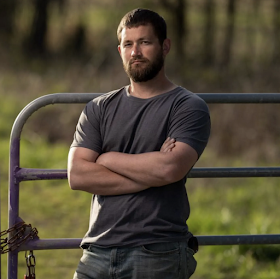 |
| Hunter Hollingsworth stands on his property in Benton County, Tennessee. (Photo from Institute for Justice) |
Biron provides an example from a state where game wardens now have to get warrants: "Hunter Hollingsworth, a railroad technician, lives about 10 minutes from the family-owned 93-acre property in Benton County . . . . He was driving through his rural Tennessee property one morning when he saw something sparkle." Hollingsworth told Biron, "I thought it was a raccoon or a possum, shining in a tree. Then I realized it was a camera with an antenna."
Biron explains, "It turned out state and federal wildlife agencies had hung the camera on his property, Hollingsworth said, seeking evidence that he was breaking conservation laws. . . . Though he acknowledged breaking one such rule, Hollingsworth said the camera was an invasion of privacy. Experts say the legalities involved go beyond wildlife conservation, touching on policing, online privacy and more." Hollingsworth told Biron, "They were surveilling every time I came and left, so they could come and check me every time I hunted."
 |
| Benton County, Tennessee (Wikipedia) |
Biron outlines the history: "The U.S. Constitution prohibits unreasonable searches of 'persons, houses, papers, and effects.' but the Supreme Court has interpreted that to mean that while officers require a warrant or just cause to search a home, legal protection does not extend beyond the house's immediate vicinity. This is called the open-fields doctrine. Barry Friedman, a law professor at the New York University School of Law, told Biron, "The doctrine is in serious need of attention as it gives license to law enforcement that is inconsistent with constitutional guarantees."
Hollingsworth sued to protect his privacy, and a state judge last ruled that "game wardens could not enter private land without a warrant. . . . Now the lawyer who spearheaded the case is trying to push other states with similar provisions and has begun another lawsuit in Pennsylvania." Joshua Windham, the attorney behind the cases for the Institute for Justice, a nonprofit, libertarian law firm, told Biron, "This is police state-style tactics, treating people's private spaces as presumptively open to prying eyes and surveillance."
Citing Carrie Leonetti, a professor at the University of Auckland in New Zealand, Biron notes that the open-fields doctrine "arose at a time when most Americans lived in rural areas." Leonetti told Biron, "It's when the average person stopped living on farms and moved into suburban areas that this got really baffling. . . . The framework just doesn't fit with the vast majority of the ways that people live now." Biron adds, "Courts have had to wrestle with how these powers apply to suburban yards, apartment buildings and even homeless encampments." Hollingsworth sees it this way: "If I'm on a road on my property, I wouldn't expect privacy. But if I'm in the woods or in a field that you'd have to be on my property to see, I would expect that to be private."
Hollingsworth sued to protect his privacy, and a state judge last ruled that "game wardens could not enter private land without a warrant. . . . Now the lawyer who spearheaded the case is trying to push other states with similar provisions and has begun another lawsuit in Pennsylvania." Joshua Windham, the attorney behind the cases for the Institute for Justice, a nonprofit, libertarian law firm, told Biron, "This is police state-style tactics, treating people's private spaces as presumptively open to prying eyes and surveillance."
Citing Carrie Leonetti, a professor at the University of Auckland in New Zealand, Biron notes that the open-fields doctrine "arose at a time when most Americans lived in rural areas." Leonetti told Biron, "It's when the average person stopped living on farms and moved into suburban areas that this got really baffling. . . . The framework just doesn't fit with the vast majority of the ways that people live now." Biron adds, "Courts have had to wrestle with how these powers apply to suburban yards, apartment buildings and even homeless encampments." Hollingsworth sees it this way: "If I'm on a road on my property, I wouldn't expect privacy. But if I'm in the woods or in a field that you'd have to be on my property to see, I would expect that to be private."
No comments:
Post a Comment